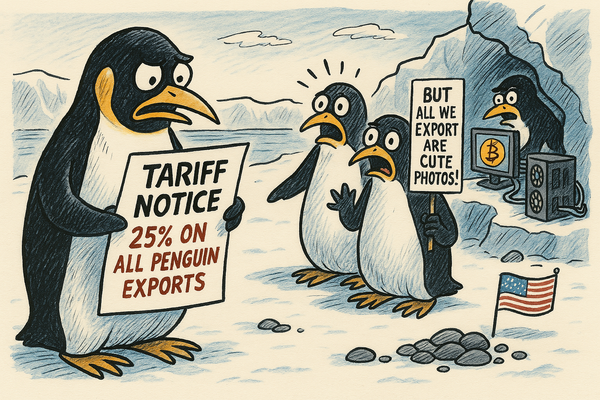APRIL FOOLS? NOPE, JUST CRYPTO: The 5 Most Unbelievable (But 100% Real) Crypto Stories of 2024

APRIL 1, 2025 — As is tradition on this day, news outlets worldwide publish outlandish stories designed to fool readers. But in the cryptocurrency world, distinguishing between satire and reality has become increasingly challenging. Today, we're highlighting five crypto stories from 2024, in no particular order, that sound like April Fools' jokes but are, in fact, completely true.
1. North Korea: The World's Most Successful Crypto Startup
In what sounds like the plot of a far-fetched techno-thriller, North Korea continued its reign as the world's most successful "crypto startup" in 2024, stealing billions of dollars in digital assets. The isolated nation, struggling under international sanctions, has maintained a sophisticated cyber army that has outmaneuvered security experts at major exchanges and DeFi protocols.
The Lazarus Group, North Korea's elite hacking unit, pulled off several major heists, including the infamous bridge exploit that netted them hundreds of millions of dollars in a single operation. According to intelligence reports, these funds directly financed the country's nuclear weapons program.
Most absurd detail: The Lazarus Group created an entire fake tech company complete with LinkedIn profiles, job postings, and a GitHub repository for a non-existent password manager. They interview developers for fake jobs, asking them to 'test' their malware as part of a timed coding exercise. Candidates who 'pass' the interview don't get a job offer—they get their systems compromised, with the hackers particularly targeting those working on cryptocurrency projects. The elaborate ruse has been running for over a year, showing that North Korea's most successful 'startup' is essentially a criminal HR department.
2. Presidential Pump: Trump Launches "TRUMP Coin"
Following his return to the presidency, Donald Trump embraced the cryptocurrency world by launching his own meme coin, "TRUMP Coin." Despite years of previously calling Bitcoin "a scam against the dollar," Trump pivoted to becoming crypto's most powerful advocate.
Within 48 hours of its launch, TRUMP Coin reached a fully diluted valuation of over $2 billion, despite having no technical innovation or utility beyond a vague promise to "make money great again." The token saw significant trading volume after Trump announced that holders might get "special consideration" for certain government appointments.
Most absurd detail: Blockchain analysis revealed that approximately 80% of the total token supply was retained by the project team—a tokenomics structure that would typically raise red flags among experienced crypto investors. Despite this highly concentrated ownership, enthusiastic supporters purchased millions of dollars worth of tokens in the first days of trading.
3. Worldcoin's Global Eyeball Collection Campaign
Sam Altman's controversial Worldcoin project expanded its operations globally, convincing millions of people to scan their irises in exchange for a crypto token. The project, which claims to be creating a global identity and financial network, essentially built the world's largest biometric database in record time.
From Chile to Indonesia to Kenya, thousands of people formed long lines for the chance to have their eyeballs scanned by the distinctive spherical "Orbs" in exchange for an allotment of Worldcoin's digital currency equivalent to about $50 USD. In Nairobi, Kenya's capital, many participants who lined up reported in local interviews that they were unemployed and heard about the project as a way to make quick money, completely unaware that their biometric data was being collected and stored.
Most absurd detail: Kenyan authorities eventually raided Worldcoin's Nairobi warehouse, citing a "lack of clarity on the security and storage" of residents' eyeball scans. Company officials subsequently announced they had "paused ID verifications" in Kenya as they "work with local regulators to address their questions"—a corporate euphemism for having government officials confiscate your biometric scanning equipment.
4. FTX's Fall: Bahamas Penthouses, Orgies, and Missing Billions
What began as crypto's golden child ended as its greatest cautionary tale. The collapse of FTX and the subsequent trial of founder Sam Bankman-Fried revealed a company culture that seemed more like a fictional Wall Street parody than a multi-billion dollar financial exchange.
Court documents and testimony painted a picture of a $32 billion company run by a small group of inexperienced twenty-somethings living together in luxury Bahamas penthouses, making investment decisions worth hundreds of millions of dollars while high on stimulants. Company funds were allegedly used to purchase lavish real estate, finance political campaigns, and fund executives' personal ventures and lifestyles.
Most absurd detail: Testimony revealed that while portraying himself as a disheveled, altruistic genius to the media, Bankman-Fried allegedly presided over what witnesses described as drug-fueled parties and company retreats where executives would "do stimulants to work" and engage in polyamorous relationships, all while customer funds were allegedly being misappropriated. The contrast between the carefully crafted public image and the reality of the company's operations left even seasoned financial crime investigators stunned.
5. Meme Coins Outvalue Fortune 500 Companies
In perhaps the most telling sign that we're living in a simulation, several meme coins based on internet jokes, random animals, and nonsensical phrases reached market capitalizations exceeding those of established Fortune 500 companies with thousands of employees and billions in revenue.
One particular token, based on an obscure internet meme featuring a dancing pickle, reached a valuation of several billion dollars despite having no purpose beyond its amusing name. This made it more valuable than major airlines, retail chains, and manufacturing companies with decades of history and physical assets.
Most absurd detail: A collection of the top 10 meme coins briefly had a combined market cap exceeding the GDP of a small developed nation, despite none of them having any functioning product, revenue stream, or purpose beyond speculation and community jokes.
If you're new to crypto and reading these stories makes you question reality, you're not alone. Veterans of the space have developed a unique immunity to absurdity—where the line between April Fools' jokes and Tuesday morning crypto news has been permanently blurred.
As we move further into 2025, remember: in crypto, the most unbelievable headlines are often the real ones.
Editor's Note: We considered including several other stories that were equally absurd but completely factual, including the revival of previously failed projects under new names, hacks where the perpetrators returned the money after being called "uncool" on Twitter, and the venture capital firm that deployed hundreds of millions of dollars based primarily on the vibes of founder Twitter accounts. Perhaps next year.





